- Home
- Margaret Atwood
Life Before Man Page 7
Life Before Man Read online
Page 7
Nevertheless, glancing around at the other drinkers, he's uneasy. His pleasure, he knows, is merely theoretical and quite possibly snobbish. No one here with him is much interested in theory. Not many of the book-writers out tonight, mostly zip-front jackets, and they aren't taking it well; they're grumpy and even downright surly, as if they're watching their next-door neighbors throwing a loud party to which they haven't been invited. "Fucking frogs," one of them mutters. "Shoulda kicked them out of the country a long time ago."
Someone else says it will mean the end of the economy: Who'll take the chance of investing? "What economy," his friend quips. "Anything's better than stagflation." A theme the commentators pick up, second-guessing the future between the songs and kisses.
Nate feels a surge of exhilaration shoot through him, up from the belly, almost sexual, out to the fingers where they hook around his glass. None of them knows, none of the bastards knows. The earth is shifting under their feet and they can't even feel it, anything can happen!
But instead of the wizened monkey-face of Rene Levesque, who is thanking his supporters in the Paul Sauve Arena up there on the screen, he sees Lesje, her eyes, her thin hands, floating across from him at the lunch table, veiled in smoke. He can't remember anything she said; did she even say anything? He doesn't care, he doesn't care if she never says anything at all. He just wants to look at her, into her, into those dark eyes which are possibly brown, he can't remember that either. He remembers the shadow in them, like the cool shadow under a tree. Why did he wait so long, jittering in phone booths, spastic, unable to speak? At lunch he picked rolls apart and talked politics when what he should have done, he should have taken her in his arms, right there in the Varsity Restaurant. Then they would have been transported, they would have been somewhere else. How could he know where, since it would be somewhere he's never been before? Some place utterly unlike the country inside Elizabeth's blue dressing gown, or the planet of Martha, predictable, heavy and damp. Holding Lesje would be like holding some strange plant, smooth, thin, with sudden orange flowers. Exotics, the florists called them. The light would be odd, the ground underfoot littered with bones. Over which she would have power. She would stand before him, the bearer of healing wisdom, swathed in veils. He would fall to his knees, dissolve.
Nate, pushing back this image, places it in time: a Saturday matinee of She, seen when he was an impressionable twelve and masturbating nightly. His mother used to nag him about those matinees; I'm sure they're bad for you, she said. All that cowboys and shooting. A woman draped in cheesecloth, terrible actress, he'd shot paper clips and spitballs at her and jeered with the rest, he'd mooned over her for weeks. Nevertheless he wants to leap onto his bicycle and pedal like a maniac over to Lesje's apartment building, walk like Spiderman up the wall, swoop through the window. Don't say anything, he'd tell her. Come with me.
True, she's living with some man or other. Nate can remember him dimly, holding Lesje's elbow at last year's Museum Christmas party, a negligible pink smudge. He forgets about him almost immediately and returns to Lesje, his hand lighting her cigarette. Another inch and he'd have touched her. But it's too soon to touch her. He knows she gets up in the morning, eats breakfast, goes to work where she does incomprehensible things, disappears at intervals into the ladies' room, but he doesn't want to contemplate these details. He knows nothing about her actual life and he doesn't want to know anything. Not too much, not yet.
Saturday, November 20, 1976
ELIZABETH
They walk up the steps, bypassing the popcorn man with his candy apples and balloons and his noisemakers and plastic windmills, violent blue and red, a sound like dried birds still flapping. A family. When they come out again they will have to buy something for the children, because that is what families do.
Elizabeth said she would come with them because Nate was right, it's bad for the children that they never do anything as a family any more. The children were not fooled. They weren't overjoyed, merely surprised and a little apprehensive. "But you never come when Daddy takes us," Nancy said.
Now, in the vaulted rotunda with the Saturday river of children funneling through the turnstiles, she doesn't think she can take the pressure. This is where she works. It's also where Chris worked. It's all right for her to be here on weekdays, she has a good reason and a lot of memos to occupy her mind; but what is the point now? Why use her own free time to walk among empty suits and metal shells and bones discarded by their owners? Any more than she has to.
She'd taken care not to speak to him or even see him if possible during office hours. It wasn't that she cared who knew, though she didn't flaunt it, she didn't need to; in the Museum, by a process of discreet seepage, everybody ultimately knew everything. But she was paid to do a job, so many hours a day, and she took that seriously. She hadn't spent those hours on Chris.
Not since the first time, when they made love with most of their clothes on, lying on the floor of his workroom among scraps of fur, shavings of wood, beside the partly finished replica of an African ground squirrel. The glass eyes had not yet been inserted, the ragged sockets watched them. The whole Museum still smells of that day: preservative, sawdust, and the smell of Chris's hair, a molten smell, singed and rich. Burnt gold. His cold zipper which pressed into the flesh of her inner thigh, the teeth rasping. She thought: I will never again settle for anything less than this. As if it was a bargain, which perhaps it was, though she'd never been able to see the invisible bargainer on the other side.
The children are in the gift shop, looking at the dolls, cloth lions from Singapore, clay babies from Mexico. Nate is fumbling with his wallet. It was his idea so he will pay, but she knows, knew when they left the house, that he wouldn't have enough money.
"Can you lend me five?" he says to her. "I'll pay you back Monday."
She hands him the money, which she has ready in her hand. It's always five. Sometimes he pays her back; when he doesn't it's because he forgets. She no longer reminds him, as she did in the days when she thought everything should be fair.
"I won't go in," she says. "I'll meet you on the steps at four-thirty. We can take the girls to Murray's for a sundae or something."
He seems relieved. "Right," he says.
"Tell the children to enjoy themselves."
She walks south towards the park, meaning to cross the road and stroll under the trees, perhaps sit on one of the benches and breathe in the smell of fallen leaves. The last smell of leaves she'll get before the snow. She stands on the curb, waiting for a chance to cross. A few tattered wreaths still on the cenotaph. SOUTH AFRICA, it says.
She turns and walks back towards the Museum. She'll go to the Planetarium; that will kill the time. Even though she helps with the posters and displays, she's never been in there. She works during the weekday matinees and she wouldn't ordinarily go to something like that in the evening, on her own time. But today she wants to go somewhere she's never been.
The lobby is brick-lined. There's a motto on the curved wall:
THE HEAVENS ARE CALLING YOU AND WHEEL AROUND YOU DISPLAYING TO YOU THEIR ETERNAL BEAUTIES AND STILL YOUR EYE IS LOOKING ON THE GROUND
- DANTE
And below that: INFORMATION. ADVANCE TICKET SALES.
Elizabeth finds it reassuring that even eternal beauties cost money. The show is at three. She goes to the window to buy a ticket, though she supposes she could get in on her pass card.
"Cosmic Disasters, or the Laserium?" the girl says.
"Pardon?" Elizabeth says. Then she realizes that "Cosmic Disasters" must be the name of the current show. Laserium, however, suggests nothing to her but a leper colony.
"The Laserium isn't until four-fifteen," the girl says.
"Cosmic Disasters, then," Elizabeth says. The Laserium, whatever that is, would be too late.
She stands around in the lobby examining the covers of the books in the bookshop window. The Stars Belong to Everyone. The Universe. Black Holes. She's never felt much friendline
ss towards the stars.
The auditorium is a dome; it's like being inside a breast. Elizabeth knows it's supposed to represent the sky; nevertheless she feels a little stifled. She leans back in the plush seat, gazing at the ceiling, which is blank but glows with a faint light. The children around her wriggle and twitter until the lights dim. Then they hush.
It's sunset. All around is the Toronto skyline, its outlines and signs: the Park Plaza squat now compared to the Hyatt Regency beside it; BRITANNICA to the east; Sutton Place, the weather building, the CN Tower. This is earth.
A voice tells them that they're seeing the skyline as it would look if they were standing on top of the Planetarium. "Hey, that's neat," the boy next to her says. He radiates bubble gum. Elizabeth feels him beside her, a warm reassuring presence. Rubber sneaker soles.
The light on the western horizon fades and the stars begin to shine. The voice names the constellations: the Bears, the Dippers, Cassiopeia's Chair, Orion, the Pleiades. The voice says that the ancients used to believe people could become stars or constellations when they died, which was a poetic thought but of course not true. The stars are in fact much more wonderful and surprising than the ancients imagined. They are flaming balls of gas. The voice goes into a rhapsody of numbers and distances, during which Elizabeth tunes out.
The North Star: a small white arrow points to it. The voice speeds up time and the stars wheel around the pole. To see that you would have to stand for nights with your eyes glued open. The ancients thought that the stars really moved that way, but of course it's the earth that rotates.
The ancients had other beliefs as well. Ominous music. Today's show is about unusual stellar events, the voice says. The stars rotate backwards in time, to the year 1066. Picture of the Bayeux Tapestry, with William the Conqueror looking gleeful. The ancients believed that comets meant disruptions, war, pestilences, plagues, the birth of a great hero, the fall of a throne or the end of the world. The voice gives a dismissive laugh. Everyone knows better now.
Halley's Comet appears in the sky, faint at first, then brighter and brighter, its tail streaming out like blown cloud. The voice gives some information on the composition of this tail. The word "comet" comes from cometes, hairy. The ancients thought of comets as hairy stars.
Halley's Comet fades, then vanishes. It will return, the voice says, in 1985.
Stars begin to fall, a few at a time, then more and more. They aren't really stars, the voice explains, merely meteorites. Meteorites come in showers. They are probably debris left over from exploded stars. As the stars fall, slides of paintings - crowd scenes, Dances of Death, burning buildings - flash on the dome and the voice recites a few verses from Shakespeare. Then the voice produces some Northern Lights and begins to discuss their causes. Some people claim to have heard them, a high rustling noise, but this has never been recorded. Elizabeth feels a thin whisper close to her ear.
She's cold. She knows it's warm in the room and she can smell the children, coats, popcorn oil; but the Northern Lights are making her cold. She wants to get up and leave the auditorium. She looks around for the door, but she can't see it. She doesn't like the idea of groping around in the dark.
Now the voice is going to reveal something extraordinary. They've all heard about the Star of Bethlehem, haven't they? Yes. Well, maybe there really was a Star of Bethlehem. Above, the stars rotate back through centuries, two thousand years. See that?
The children breathe, Oh. A star is growing, bigger, brighter, till its light fills half the sky. Then, diminuendo. Like a firework, it's gone.
"That was a supernova," the voice says. "A dying star." When a star came to the end of its life, it might explode, burning up all its remaining energy in one spectacular burst. Someday our own sun would do that. But not for billions of years.
Then the remaining matter, lacking the energy to balance its own gravitational field, would collapse into itself, forming a neutron star. Or a black hole. The voice and its pointer locate a space in the sky where there is nothing. No one can see a black hole, says the voice; but because of their effects on objects around them they are known to exist. No light, for instance, shines through them. Nobody quite understands black holes yet, but they are thought to be stars collapsed to a density so great that no light can escape from them. They suck energy in instead of giving it out. If you fell into a black hole, you would disappear forever; though to anyone watching, you would appear to have been frozen for eternity on the black hole's event horizon.
The piece of blackness expands, perfectly round, lightless, until it fills the center of the dome. A man in a silver suit falls towards it, reaches it, stops.
The man hangs spread-eagled against the blackness while the voice explains that he has actually disappeared. He's an optical illusion. That would be a real cosmic disaster, the voice says. What if the earth, without knowing it, were approaching a black hole? The silver man vanishes and the stars twinkle again, while the voice explains that such a thing is not really very likely.
Elizabeth, shivering, stares up at the sky, which isn't really a sky but a complicated machine with tiny lights projected by slides and push-buttons. People do not become stars of any kind when they die. Comets do not really cause plagues. Really there is nobody in the sky. Really there is no round sphere of darkness, no black sun, no frozen silver man.
Saturday, November 20, 1976
LESJE
Lesje feels awkward, as if the bones of her elbows and knees aren't really touching but are attached to one another with string. Gangling. Surely her teeth are larger than usual, her chest is flatter. She pulls her shoulders back. Nate's children aren't exactly unfriendly, but there's a withholding, a narrow-eyed evaluation. The new teacher. Prove to us that we should be here. Prove you're worth our attention. Who are you anyway and what are you getting us into? Nate said when he asked her to do this that they were very interested in dinosaurs, but at the moment she doesn't believe it.
The three of them are looking through glass at the effigy of the paleontologist, kneeling in his cubicle among simulated rocks. He has a hat on and he's chalky white, with clean-cut First World War air-ace features and well-trimmed hair. Silent Sam, they've nick-named him. Quite unlike Professor Morgan, whiskered and unkempt leader of the only dig Lesje has been privileged to attend, as flunky and chief varnisher. He kept his pipe tobacco in his right pocket and emptied the old pipes into his left one. Several times he caught fire and they had to put him out. Balderdash. Man doesn't know what he's talking about. He thought Lesje was one of the biggest jokes he'd heard. So you want to be a paleontologist. Better off learning to cook. Worst coffee I ever tasted. Lesje cringing - because she respected his opinion, had read every one of his papers she could get her hands on, and his book on carnivorous dinosaurs of the Canadian plains - appeasing him with more and better cups of coffee, or tea, or Scotch, running her ass off like some dumb airline stewardess, trying to find ways to please him, until she discovered there weren't any. Luckily her current boss, Dr. Van Vleet, isn't anything like that, though he must be even older. On the other hand Lesje can't imagine him digging anything up. He specializes in the classification of teeth.
But the man in the glass case is a model. He's holding a fossil; presumably he's undergoing the ecstasy of scientific discovery, but his face isn't giving any of that away.
"What's he doing?" Nancy wants to know. Lesje suspects she doesn't really want to know, but it's part of this charade that the children must ask polite questions and Lesje must turn herself inside out trying to answer them.
"He's plaster-coating a bone," Lesje says. "He has to do it very carefully because it isn't real bone, it's a fossil. The softer parts of the bone decayed away and the shape of the bone has been filled up with minerals, so it's kind of like stone. It's very brittle."
"I know," Janet says. "Daddy told us."
"Is that your job?" Nancy says.
"Well, part of it," Lesje says.
"That's a funny job," Nancy says.
"Well, I do other things too," Lesje says, wondering why she's defending herself to a nine-year-old. Or is she eight? "Actually I've never done that much actual digging. I did a lot of bone preservation. Some of the fossils have to be preserved right away or they'll fall apart. We coat them with Gelva. That's a kind of resin."
The children stare through the glass at the rigid paleontologist, who the more you look resembles a corpse, Lesje thinks, with his pallor and fixed eyes. Janet's face is clamped as though she's caught an off smell, Nancy is curious but uninvolved. How can Lesje explain to them why she does this, why she loves doing this? The day they found the Albertosaurus, a thigh, a vertebra. Morgan: "What have we here?" Disappointed because it was a well-known species. But Lesje: Live again! she'd wanted to cry, like some Old Testament prophet, like God, throwing up her arms, willing thunderbolts; and the strange flesh would grow again, cover the bones, the badlands would moisten and flower.
But that can't happen, so the next best thing is these displays, with the admittedly plastic vegetation among which the bones, articulated and rearticulated after furious argument over which way the creatures had actually walked, rear their gigantic heads and cavernous eye-sockets far above the craning necks of those who are, by the grace of their ancestors, still living.
In the Cretaceous twilight the children press buttons, watching the colored slides flip through their cycles while the Museum's automated voices drone. Lesje knows she's superfluous. Nate strolls up beside her, lounging, unconscious, and she wants to shake him. What is all this about, why has he put her through it? Made her sacrifice her free time (she could have been shopping! reading! copulating!) for this lack of an event? Is she being inspected, is it a test, has she failed? If he wants to make a pass at her - and she doesn't know what she would do if he did that, hasn't thought beyond that first pressure of his hand on some part of her body forbidden enough to be decisive - why doesn't he make it? (Not here and now, of course; not in front of the children. Who probably would not notice.)

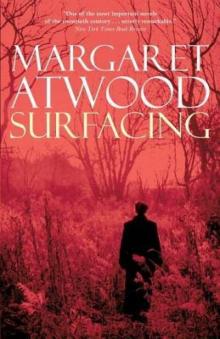 Surfacing
Surfacing Hag-Seed
Hag-Seed Oryx and Crake
Oryx and Crake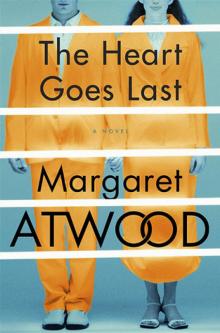 The Heart Goes Last
The Heart Goes Last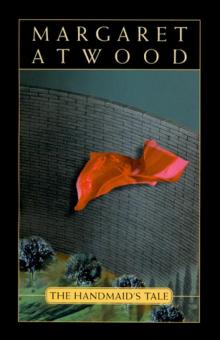 The Handmaid's Tale
The Handmaid's Tale Lady Oracle
Lady Oracle Good Bones and Simple Murders
Good Bones and Simple Murders The Robber Bride
The Robber Bride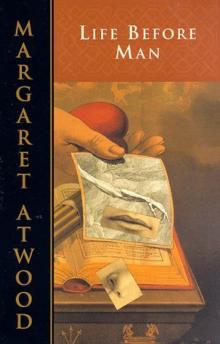 Life Before Man
Life Before Man Alias Grace
Alias Grace The Blind Assassin
The Blind Assassin Cat's Eye
Cat's Eye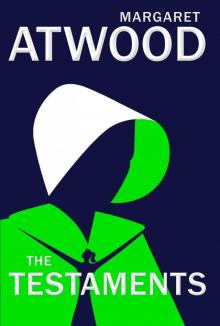 The Testaments
The Testaments The Penelopiad
The Penelopiad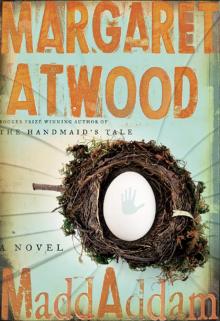 MaddAddam
MaddAddam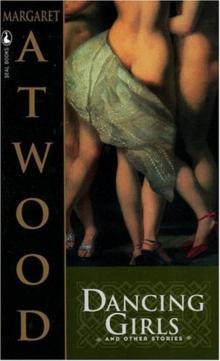 Dancing Girls & Other Stories
Dancing Girls & Other Stories On Writers and Writing
On Writers and Writing Selected Poems II (1976-1986)
Selected Poems II (1976-1986) Wilderness Tips
Wilderness Tips Dearly
Dearly The Tent
The Tent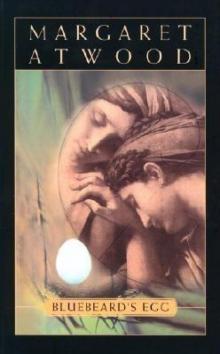 Bluebeard's Egg
Bluebeard's Egg The Edible Woman
The Edible Woman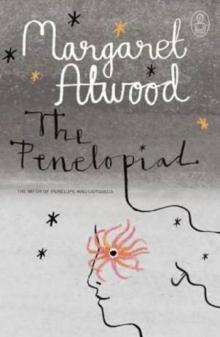 The Penelopiad: The Myth of Penelope and Odysseus
The Penelopiad: The Myth of Penelope and Odysseus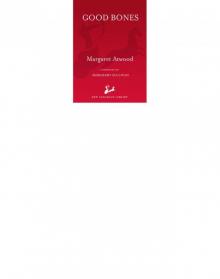 Good Bones
Good Bones I Dream of Zenia with the Bright Red Teeth
I Dream of Zenia with the Bright Red Teeth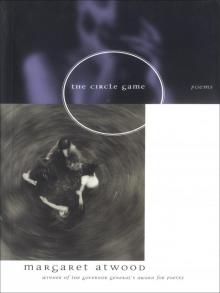 Circle Game
Circle Game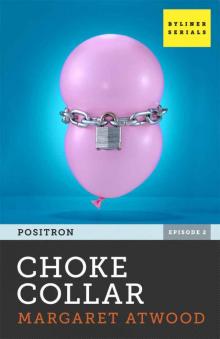 Choke Collar: Positron, Episode Two
Choke Collar: Positron, Episode Two Stone Mattress: Nine Tales
Stone Mattress: Nine Tales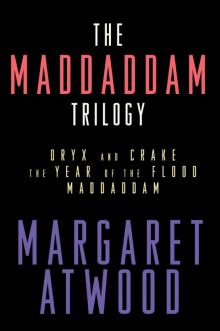 The MaddAddam Trilogy
The MaddAddam Trilogy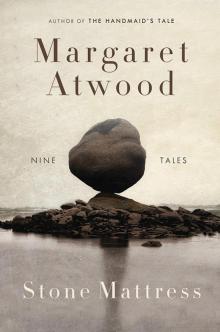 Stone Mattress
Stone Mattress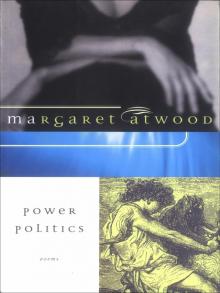 Power Politics
Power Politics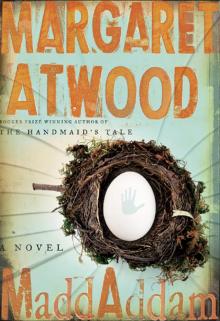 MaddAddam 03 - MaddAddam
MaddAddam 03 - MaddAddam I’m Starved for You (Kindle Single)
I’m Starved for You (Kindle Single) Murder in the Dark
Murder in the Dark In Other Worlds
In Other Worlds Dancing Girls
Dancing Girls Moral Disorder
Moral Disorder